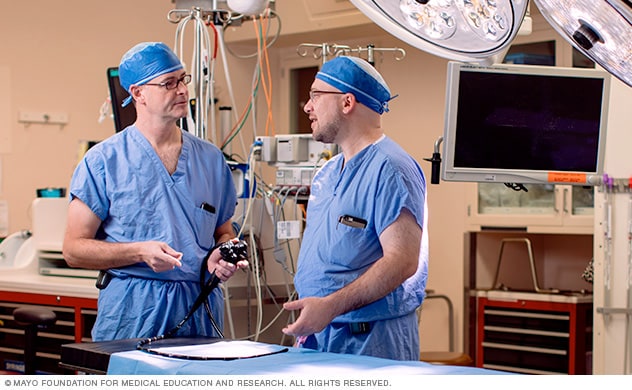Lung cancer care at Mayo Clinic
Mayo Clinic lung cancer experts offer comprehensive and compassionate care to people with lung cancer.
Your Mayo Clinic care team
At Mayo Clinic, you'll be cared for by a team of specialists from the Lung Cancer Program. Your care team is composed of experts in different fields who work together to determine your lung cancer treatment options. This team approach means your care is coordinated to meet your needs so that you receive the treatment that's best for you.
Your care team may include:
Having a multidisciplinary team of experts on your side means that all of your doctors are on the same page. This is especially beneficial when it comes to coordinating complex treatment protocols involving multiple therapies.

Thoracic surgeons work in a team with other specialists to coordinate lung cancer treatments.
Advanced diagnosis and treatment
Lung cancer screening saves lives.
Click here for an infographic to learn more
Mayo Clinic doctors have access to the latest diagnostic and treatment innovations and technology, including:
- Lung cancer screening. Mayo Clinic doctors participated in the landmark study that proved that lung cancer screening saves lives. Mayo Clinic's lung cancer screening program uses low-dose CT scans to detect cancer at its earliest, most treatable stage.
- Advanced laboratory techniques. Laboratory analysis of your cancer cells can help your doctor determine your prognosis and decide which treatments are mostly likely to benefit you.
- Minimally invasive surgery. Mayo Clinic thoracic surgeons use minimally invasive techniques when possible. Surgeons use video-assisted thoracoscopic surgery (VATS) and robotic surgery to perform VATS lobectomy, robotic lobectomy and other minimally invasive operations. Surgeons work to remove the smallest amount of lung tissue necessary through procedures such as wedge resection, sleeve lobectomy and bilobectomy.
- Highly targeted radiation therapy. Radiation oncologists have access to the latest technology to carefully shape and precisely deliver radiation to the target. Targeted treatment is available through intensity-modulated radiation therapy (IMRT), volumetric modulated arc therapy (VMAT), image-guided radiation therapy (IGRT) and proton therapy. These techniques reduce the risk of side effects and improve outcomes.
- Carefully selected systemic therapy. Mayo Clinic oncologists have access to a variety of systemic treatments including chemotherapy, targeted therapy and immunotherapy. Systemic treatments are selected using many factors, including the genetic makeup of your cancer cells.
- Access to clinical trials. Clinical trials conducted at Mayo Clinic and through research partnerships may give you access to treatments before they're widely available.
Experience you can trust
Mayo Clinic lung cancer specialists are highly trained and experienced in using the latest treatments to provide personalized care.
People with lung cancer who seek care at Mayo Clinic can expect:
- Extensive experience treating lung cancer. Each year, more than 6,000 people with lung cancer receive care at Mayo Clinic. This experience means that your doctors are equipped with the knowledge and resources to provide you with exactly the care you need.
- Expertise in all types of lung cancer. Mayo Clinic lung cancer specialists have experience treating all types and stages of lung cancer, including rare types and multifocal lung cancers.
- Skilled surgeons. More than 1,100 people undergo minimally invasive lung operations at Mayo Clinic every year. Studies show that hospitals with high surgical volumes have improved outcomes, including reduced post-surgical pain, shorter hospital stays and fewer complications.
- Exactly the care you need. Your doctors will take the time to get to know you and understand your treatment goals. Your treatment plans take your values and preferences into account.
- Coordinated supportive care. A full range of supportive services are available to keep you comfortable during and after treatment for all stages of lung cancer. For people with metastatic lung cancer, early palliative care has been linked to improved quality of life and improved survival. For those undergoing multimodal therapy, supportive care may make it more likely that you'll be able to complete your treatment on schedule.
Expertise and rankings
Mayo Clinic lung cancer specialists are widely respected for their expertise and experience in using the latest treatment options to provide personalized care for people with lung cancer.
- Mayo Clinic Comprehensive Cancer Center meets the strict standards for a U.S. National Cancer Institute comprehensive cancer center. These standards recognize scientific excellence and a multispecialty approach focused on cancer prevention, diagnosis and treatment.
- Mayo Clinic doctors and researchers participate in research cooperatives, such as the Alliance for Clinical Trials in Oncology, which gives people with cancer access to the latest clinical trials.
- Mayo Clinic Comprehensive Cancer Center is accredited by the American College of Surgeons' Commission on Cancer, which recognizes high-quality cancer treatment programs that provide comprehensive and multidisciplinary care.
Mayo Clinic in Rochester, Minnesota, Mayo Clinic in Jacksonville, Florida, and Mayo Clinic in Phoenix/Scottsdale, Arizona, are ranked among the Best Hospitals for cancer by U.S. News & World Report. Mayo Clinic in Rochester, Minnesota, is ranked as the top hospital in Minnesota, Mayo Clinic in Phoenix/Scottsdale, Arizona, is ranked as the top hospital in Arizona, and Mayo Clinic in Jacksonville, Florida, is ranked the top hospital in Florida.
Locations, travel and lodging
Mayo Clinic has major campuses in Phoenix and Scottsdale, Arizona; Jacksonville, Florida; and Rochester, Minnesota. The Mayo Clinic Health System has dozens of locations in several states.
For more information on visiting Mayo Clinic, choose your location below:
Costs and insurance
Mayo Clinic works with hundreds of insurance companies and is an in-network provider for millions of people.
In most cases, Mayo Clinic doesn't require a physician referral. Some insurers require referrals or may have additional requirements for certain medical care. All appointments are prioritized on the basis of medical need.
Learn more about appointments at Mayo Clinic.
Please contact your insurance company to verify medical coverage and to obtain any needed authorization prior to your visit. Often, your insurer's customer service number is printed on the back of your insurance card.